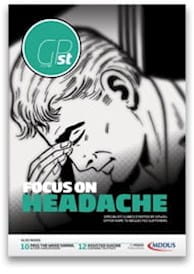● THERE WILL BE BLOOD Razors are not usually part of a GP’s medical kit, but they are a more familiar sight in India. Recent reports from Delhi show the ancient tradition of bloodletting is thriving. The Daily Mail published images of patients undergoing the treatment at an open air clinic. To facilitate blood flow, patients must stand in the heat for half an hour then be wrapped in rope while practitioners make tiny nicks in the skin of the affected area of the body. Bloodletting involves instigating controlled bleeding in an attempt to rid the body of so-called “polluted blood”. The technique is said to have been modelled on the process of menstruation. It was discredited in Europe at the end of the 19th century but is enjoying something of a comeback. A study published in the journal BMC Medicine in 2012 suggested the treatment could help reduce blood pressure and LDL cholesterol. Although, perhaps statins would be less risky?
● PET PROTECTION…FROM It’s a far more dangerous world out there than you might imagine for GPs dispatched on home visits. Recent figures show there were almost 60,000 assaults against NHS staff in England in 2011/12 – some of these not by patients but their dogs. New proposals put forward by NHS Protect’s Legal Protection Unit would see laws relating to dog attacks in public places extended to cover private premises. This means owners would be held responsible for the behaviour of their pets during home visits by medical staff . Speaking to Pulse, Liverpool GP and chair of Sefton LMC Dr Andrew Mimnagh was just a bit sceptical: “Fingers crossed it might improve things but at the end of the day it’s not going to stop you getting bitten if there’s a sick patient who needs attention and they cannot control a dog due to their ill health…. Dogs are quite territorial and as usual it’s not the dog barking loudly at you at the door you need to worry about but the ones that are waiting quietly inside for you.” Maybe the NHS could encourage GPs to adopt an approach familiar to the US gun lobby. Bring a bigger dog!
● MUCKY MITTS ONLY one in 20 people wash their hands for long enough to kill germs after using the toilet, according to a US study by Michigan State University. To make things worse, a third don’t use soap while 10 per cent don’t wash their hands at all. Men were singled out as the worst off enders. Researchers monitored the habits of 3,749 people using public toilets. The findings caused surprise as past research has suggested thorough hand washing occurs at a higher rate. A vigorous hand wash with soap and water for 15 to 20 seconds can effectively kill most infection-causing germs. However, most people washed their hands for an average of just six seconds. Nearly half of all food borne illness outbreaks are said to be caused by a failure to properly wash hands. Now pass the sanitiser…
● FAME MAY BECKON Role models for patients may be one thing but would you class yourself as a GP with a “relaxed style who definitely enjoys having a drink or perhaps the odd cigarette”? Someone with “everyman appeal who does not necessarily believe you need to live like a saint to be happy and healthy”. If so you could be destined for TV fame. The producers of Channel Four’s Embarrassing Bodies are looking for GPs or hospital doctors based in the north of England who could be a “counterpoint to many of the groomed, conventional, super toned medical professionals already on television”. Or so says assistant producer of Maverick TV Sue Ng. Sadly the deadline might have already passed but CVs – suitably tailored to impress – may still be welcome.
● OFFICE SUPPLIES Doctors may some day be buying 3D printers to knock up spare body parts for patients. Scientists at Massachusetts General Hospital have used the gadget, combined with cartilage from sheep, to create an artificial ear. They printed custom models that were then placed under the skin of lab rats. Next, they grew the required number of cartilage cells to fi t before the ear was moulded on a flexible wire frame. The synthetic lobe is being prepared for clinical trials in the hope they could be used in transplant operations. It’s claimed realistic looking ears could be produced for individual patients on a “rapid timescale”.
● THE SLEEP COUNCIL Nothing is more embarrassing than nodding off in a practice meeting – especially if you’re the newbie. Perhaps you are among the 40 per cent of Britons not getting the recommended six to nine hours of sleep per night. In March, the Sleep Council released its first ever Great British Bedtime Report after surveying 5,000 people. The report found that the average Brit goes to bed at 11.15pm and gets just six hours and 35 minutes sleep per night. Almost half of Brits say that stress or worry keeps them awake at night and – not surprisingly these days – high earners (£65 – £75,000) get the best sleep of all. “Sleeping well is as crucial to our health and wellbeing as eating a healthy diet or exercising regularly,” says Jessica Alexander of The Sleep Council. “we want to see sleep moved up the political agenda”. She has obviously never watched live debate in the House of Lords.
This page was correct at the time of publication. Any guidance is intended as general guidance for members only. If you are a member and need specific advice relating to your own circumstances, please contact one of our advisers.
Read more from this issue of Insight Primary

Save this article
Save this article to a list of favourite articles which members can access in their account.
Save to library